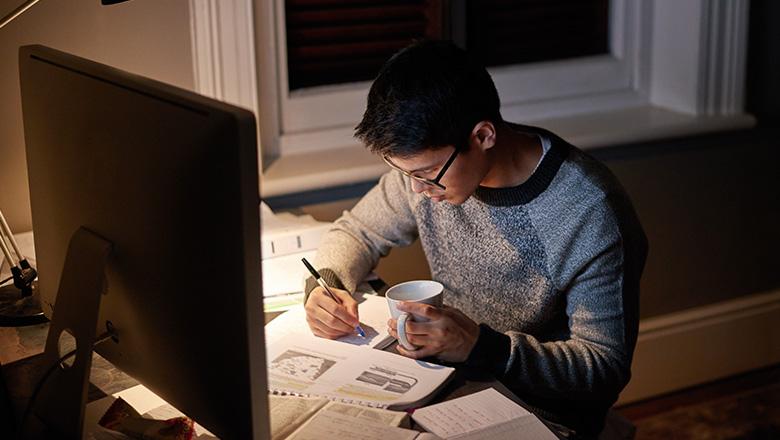Breaking your poor study habits and replacing them with good study habits could make a world of difference to your grades. It could even help you feel happier and more satisfied with school.
But when you’re right in the middle of things, it can be hard to spot the behaviours that are weighing you down. Look through the bad study habit examples below to identify what your obstacles might be and learn how to overcome them.
Cramming for exams and doing assignments the night before
Yeah, let’s get this obvious one out of the way. You might pass the occasional exam by cramming or get away with a last-minute essay every now and then, but this approach to studying isn’t sustainable.
When you cram, you’re effectively committing facts and concepts to your short-term memory. You’re unlikely to recall the information later, and you’re also not really engaging with the content and thinking about it on a deeper level.

How to stop cramming
You can break this poor study habit with a study schedule. Map out all the times you have available to study – after school, in the evenings, on weekends, even in the mornings – and plan which subjects you’ll study and revise in those time blocks.
- If you’re a bit forgetful or easily lose track of time, consider making your study schedule on your phone or laptop. This way you can set up alerts to notify you when it’s study time.
- If you’d prefer having a constant reminder of your plans and goals, instead create a physical schedule and place it prominently on your desk instead. Decorate it as you wish.
Not sure which kind of study schedule will work for you? Try both at first to see which one keeps you on track.
By using a schedule, you’ll be able to revise content from your subjects gradually over time, which will make it much easier to access the info you need when exams come up. Plus, if anything doesn’t quite make sense when you revise it, you’ll have time to check in with your teacher and get answers.
Procrastinating
It’s human nature to put off things that feel difficult and do easy things instead. It’s why you might spend hours playing games even though you know an important assignment is due soon.
A little bit of procrastination is normal and shouldn’t hurt your grades too much, so don’t be too quick to beat yourself up. But if you start to miss due dates or hand in unfinished assignments, there’s a good chance procrastination has become a serious problem.
So, how do you beat the big bad study habit that is procrastination?
One trick to reduce the impact of procrastination involves the study schedule we mentioned earlier. When you have an essay or project to complete, try putting a due date in your schedule a few days before the actual deadline. Artificially making the work seem more urgent may give you the push you need to get cracking on it sooner.
Another good way to stop procrastinating is to break up any big assignments you have into smaller, more manageable jobs. This can apply to almost any kind of task, including essays (break into research, planning, writing, proofreading) and exam prep (break into taking notes, paraphrasing your notes, comparing notes with a friend or your study group, reviewing your notes).
You can extend this approach to your general study sessions too. Break each hour into smaller chunks of time, such as 40 minutes of making notes, 10 minutes of taking a walk and grabbing a snack (breaks are important!), and 10 minutes of reading back your notes.
Getting distracted
You’re finally in the zone on your English essay when a notification on your phone grabs your attention and you lose your train of thought. Or you’re on a roll with a series of practice equations when your brother starts blasting music in the next room and now you can barely think.
You can’t always control the world around you and stop distractions from happening. But you can usually choose where to study and influence your surroundings.

How to stop getting distracted while studying
Firstly, you need to select a dedicated study zone – a sanctuary where you can focus on your schoolwork. Your bedroom or your home’s study might seem like the obvious choices, but you could also try a local library or park if your household has too many distractions.
Once you’ve chosen your study zone:
- Make sure the lighting, temperature and seating are comfortable.
- Turn off your phone or use an app to keep it from distracting you.
- Close any browser tabs that aren’t related to your study session.
- Place any items you might fidget with out of reach and out of sight.
- Ask anyone in the house not to disturb you while you’re studying.
Leaving your notes unorganised
We know taking notes in class can feel a bit rushed. You don’t always have time to neatly organise and colour-code each sentence as your teacher speaks.
That’s alright. Your notes don’t have to be meticulous or beautiful all the time.
But it’s important to organise your schoolwork and materials at least a bit. Even a simple to-do list, combined with your study schedule and a tidy study space, can help you stay productive and feel less stressed. This also ensures you won’t miss any due dates or forget any assignments.
Many students find it helpful to take those quick notes from class and recreate them in a neater format in the evening or the next day. This is a great way to review the content you’ve recently learnt, and it also means your notes are easy to find and revise when you get to exam time.
How to organise your school notes
Here are some quick tips to help you organise your schoolwork:
- Find a note-taking structure that suits your study style. Experiment with bullet points, mind maps, highlighting, colour-coding and other approaches to see what speaks to you.
- Give each of your subjects a designated notebook, folder and/or binder.
- Make sure all your notes have a title and date so they’re easy to organise and find.
- Try a digital to-do list to keep track of your tasks without cluttering up your desk.
- Review your notes each week or so. This will allow you to you spot any gaps in your notes, keep track of the key concepts throughout the term, and group together any content that is related.
Sticking to standard studying techniques
One bad study habit that flies under the radar is repeating the same approach to studying or revision, even if it’s not working that well.
Sure, some people really do learn best by writing notes and reading them back. But many people absorb information better in other ways and will struggle to retain content they’ve only seen on paper.
Even if straightforward writing/reading is your preferred study style, mixing things up every now and then can keep your study sessions fresh and your mind engaged.
How to keep your study interesting

Try some of these ideas to see what approaches to studying work well for your learning style:
- Take your written notes and summarise/paraphrase them in your own words.
- Turn paragraphs or bullet points of notes into mind maps or diagrams to make them visual.
- Record yourself speaking through your notes and play them back.
- Join or start a study group for collaborative learning and discussions.
- Try teaching the content to somebody else (take turns as the “teacher” with a study buddy, persuade a sibling to volunteer, or even gather some plushies to become an imaginary audience)
- Use flash cards to quiz yourself.
Studying too much
Yes, you read that correctly. There is such a thing as studying too much.
Committing to regular study and keeping to your study schedule is an excellent step in breaking poor study habits. But investing too much energy into your studies can become negative too – if it comes at the expense of your self-care, health and relationships.
If your study time is cutting into your exercise, meals, sleep and social activity, this can start to hurt your grades instead of helping them. This is because your brain can’t perform at its best if you’re fatigued, malnourished or burnt out.
How to avoid over-studying
To make sure your study doesn’t become unhealthy:
- Factor time for meals, snacks and exercise/sports into your study schedule.
- Stick to a consistent bedtime, even if it means sometimes interrupting your study halfway through a topic.
- Make regular time to catch up with your friends. If your friends are also your study group, make sure you do things together beyond studying.
- Be mindful of your mental health and seek help if you’re struggling.
Final thoughts
It’s important not to waste time and energy feeling guilty about any of these poor study habits. Nobody can say they’ve never procrastinated, gotten distracted or left their work in a messy pile on their desk.
What matters is that you’ve now got a good idea of the obstacles that might be holding you back in your schoolwork. And you’ve got a plan for getting over them.
Once you’ve weeded out the bad study habits that were holding you back, take things to the next level by developing these good study habits.





